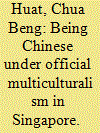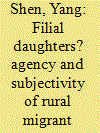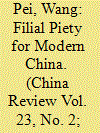| Srl | Item |
| 1 |
ID:
093964


|
|
|
|
|
| Publication |
2010.
|
| Summary/Abstract |
At the time of independence, there were three visible racial groups among its newly constituted citizenry: an overwhelming majority of ethnic Chinese; regionally indigenous Malays and a small percentage of South Asians. The Cold War conditions precluded the island-state from being a Chinese majority state; constitutionally the new state was declared a multiracial nation. The three groups were reconstituted as Huaren, Malays and Indians. Multiracialism as official policy has become a means of governance of the People's Action Party single-party dominant government. Racial harmony as the public good provides the political and administrative space for the policing of racial boundaries, suppressing open discussion of racial issues. Meanwhile, Huaren culture has been progressively reduced to emphasis on filial piety as Confucianism writ small and an emergent Singaporean identity distances the local born Huaren from the 'foreign workers' that arrive daily from the People's Republic of China.
|
|
|
|
|
|
|
|
|
|
|
|
|
|
|
|
| 2 |
ID:
146520


|
|
|
|
|
| Summary/Abstract |
In China, continuous rural–urban migration on a massive scale disrupts the traditional rural patriarchal society and makes the temporary non-patrilocal way of residence possible. This new residential pattern has brought profound changes to the lives of migrants. Based on participant observation and interviewing, this article intends to explore the exercise of agency and the representation of subjectivity of female migrant workers in intimate relations after migration. By emphasizing the intergenerational relationship and partner relationships of both unmarried and married women, I demonstrate a complicated picture regarding the changing status of rural migrant women and show how these women both conform and challenge the social norm of filial obligations, through which their agency is exerted and subjectivity is crafted.
|
|
|
|
|
|
|
|
|
|
|
|
|
|
|
|
| 3 |
ID:
189892


|
|
|
|
|
| Summary/Abstract |
Filial piety is a central virtue of Confucian ethics and widely viewed as an important part of what it means to be(come) Chinese. Confucian scholars emphasize the cultivation of filial piety (love and respect for parents) while assuming that parental love for children is innate. But this traditional view has led to the deformation of filial piety and twisted requests for parental love in both past and present-day China. In contrast, I will argue that long-lasting parental love also requires moral effort to become a virtue and that filial piety for the modern world cannot be morally justified without this form of parental love.
|
|
|
|
|
|
|
|
|
|
|
|
|
|
|
|
| 4 |
ID:
089771


|
|
|
|
|
| Publication |
2009.
|
| Summary/Abstract |
This article explores the transformation of the gendered practice of filial piety in China, which traditionally places sons at the centre and relegates daughters to a peripheral role within their natal families. Based on my ethnographic fieldwork in a rural community in north-eastern China, this article suggests a transformed opinion on filial piety, considering daughters as more filial, as is vividly expressed by the Chinese saying "A daughter is like a little quilted vest to warm her parents' hearts." Meanwhile, elderly parents have modified traditional standards of filial practice to encompass a desire for an expression of intimate care, respect and practical support from adult children. Further examination suggests three major factors contributing to the transformation of the gendered practice of filial piety: reinterpreted intergenerational relations, women's increased filial practice to their natal parents, and an increased desire of the elderly for an emotional bond with their children.
|
|
|
|
|
|
|
|
|
|
|
|
|
|
|
|